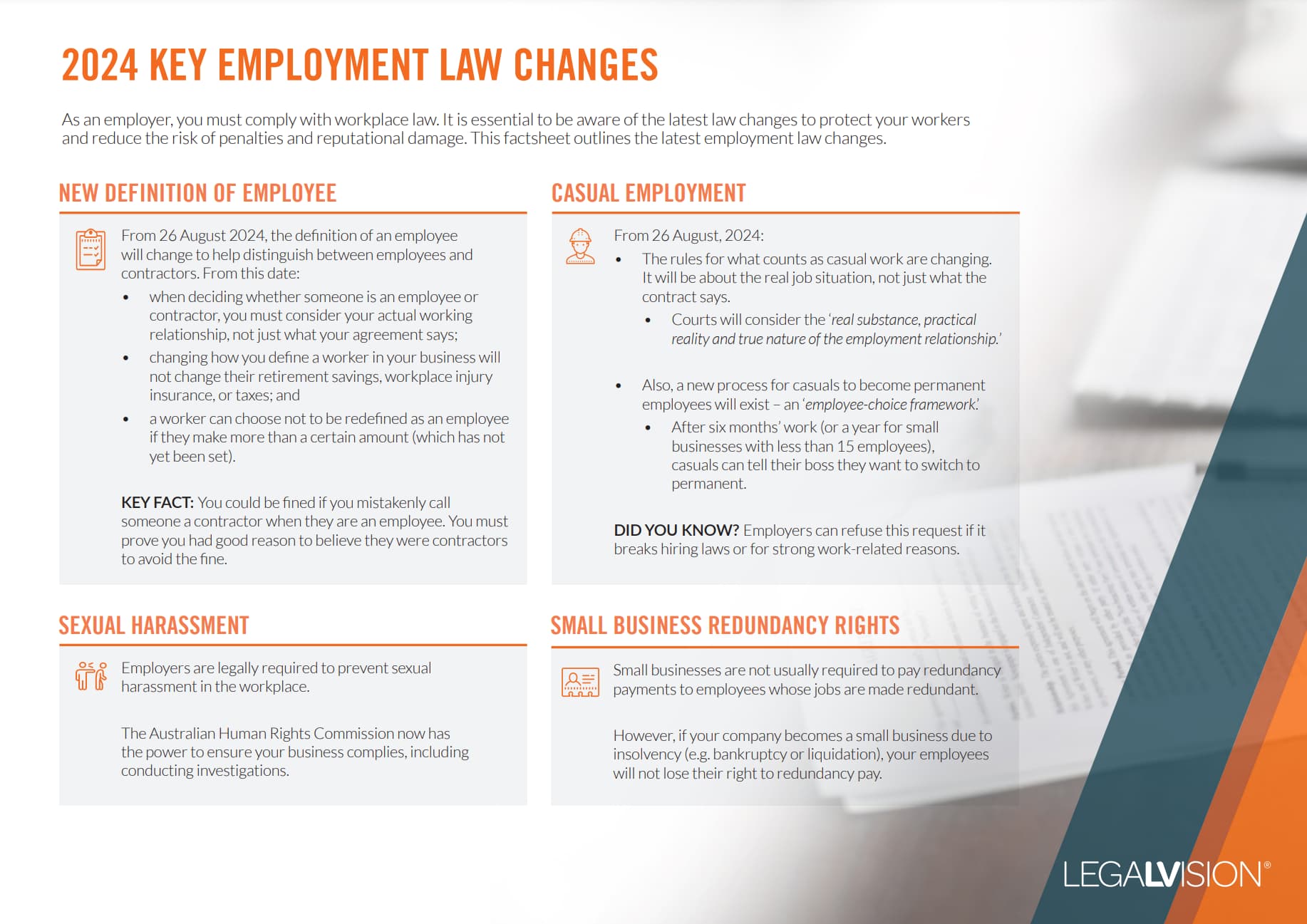If you are running a business that operates round the clock or you want to make the best use of your staff’s time, you may be thinking of asking them to work on weekends. However, before you do so, it is important to consider the legal implications. In this article, we will discuss three key legal considerations about pay, hours and employee refusal that you need to note when requiring your staff to work on weekends.
1. Weekend Pay
A key consideration for making staff work on weekends is weekend penalty rates. Penalty rates refer to higher rates of pay that can apply when employees work particular hours, such as evenings, or days, such as weekends.
Eligibility for penalty rates is usually outlined in the relevant award, enterprise agreement or employment contract.
For example, the Clerks—Private Sector Award provides that an employer must pay an employee at the rate of 125% of the minimum hourly rate for ordinary hours worked on a Saturday and 200% of the minimum hourly rate for ordinary hours worked on a Sunday.
If you need your staff to work on weekends, it is important to be aware that there are specific entitlements to penalty rates that need to be observed. These penalty rates ensure that employees receive fair compensation for working outside of normal hours. Before making any requests, it’s essential to check the relevant award and ensure that you are paying your employees in line with the applicable rates.
2. Working Hours
Another key thing to consider is how many hours your employees can work. This will correlate with their ability to work on the weekends. This includes where employees work beyond their ordinary work hours and work outside the spread of ordinary hours.
The spread of ordinary hours refers to work undertaken outside the times of the ordinary work day. The spread of ordinary hours will be outlined in the relevant award or enterprise agreement. For example, the Social and Community Services Award outlines the spread of ordinary hours as between 6 am and 8 pm from Monday to Sunday. Where an employee is working outside of these times, they will be entitled to overtime rates in accordance with the relevant award or enterprise agreement.
Further to hours worked outside the ordinary spread of hours, you must also not request an employee to work more than a certain number of hours in a week unless it is reasonable to request this. For example, you cannot request an employee to work more than:
- 38 hours a week for a full-time employee; or
- where an employee is not a full time employee, the lesser of 38 hours a week, or the employee’s ordinary hours of work in a week.
When counting these ordinary hours, you should be sure to consider all periods of leave or absence as well.
Continue reading this article below the form3. Refusing to Work Overtime
Before making your staff work overtime, including on weekends, you must consider whether this is reasonable. The Fair Work Act 2009 outlines several factors that must be taken into account when doing so. Before making a request, you should assess if:
- there is a risk to your employees’ safety from working overtime, such as issues with fatigue from overworking. This will be particularly risky if they are required to operate tools or heavy machinery;
- your employee has personal obligations, such as a family and carer’s responsibilities; and
- you have given your employee sufficient notice they will need to work overtime on the weekend.
The above list is not exhaustive; any number of factors will be considered when determining the suitability of your request. If an employee considers the request unreasonable, they may refuse to work the additional hours.

As an employer, it is essential to understand what employment laws have changed and their implications for your business — particularly the changes to the Fair Work Act 2009 through the new Closing the Loopholes legislation.
Key Takeaways
Ultimately, there are a range of provisions under the Fair Work Act that provide for flexible work hours. This flexibility means it is possible to have your employees work on weekends. However, there are still a range of legal considerations you should keep in mind, including:
- weekend pay rates;
- working hours; and
- employees’ ability to refuse to work overtime.
If you need assistance understanding your obligations as an employer and requesting your employee’s work on the weekends, our experienced employment lawyers can assist as part of our LegalVision membership. For a low monthly fee, you will have unlimited access to lawyers to answer your questions and draft and review your documents. Call us today on 1300 544 755 or visit our membership page.
We appreciate your feedback – your submission has been successfully received.











